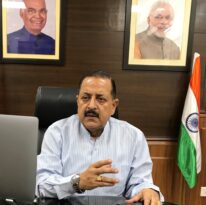Omicron Variant is Reported In 57 Countries, Variant May Have Major Impact, Warns WHO
(Special Correspondent)
Omicron variant has now been reported in 57 countries, and we expect that number to continue growing. Certain features of Omicron, including its global spread and large number of mutations, suggest it could have a major impact on the course of the pandemic. Exactly what that impact will be is still difficult to know.
- Any complacency now will cost lives. Many of those who don’t die could be left battling long COVID, or post-COVID condition, a disease with debilitating, lingering symptoms that we are only beginning to understand.
- New data are emerging every day, but scientists need time to complete studies and interpret the results. We must be careful about drawing firm conclusions until we have a more complete picture. Every day, WHO is convening thousands of experts around the world to share and analyse data and drive research forward.
—————————————————————————————————-
The Omicron variant has now been reported in 57 countries, and we expect that number to continue growing. Certain features of Omicron, including its global spread and large number of mutations, suggest it could have a major impact on the course of the pandemic. Exactly what that impact will be is still difficult to know. We are now starting to see a consistent picture of rapid increase in transmission, although for now the exact rate of increase relative to other variants remains difficult to quantify. In South Africa, the number of Omicron cases is increasing quickly. However, Omicron was detected when transmission of Delta was very low, so it had little competition. It will therefore be important to monitor carefully what happens around the world, to understand whether Omicron can outcompete Delta. For that reason, we call on all countries to increase surveillance, testing and sequencing. Our existing diagnostics work, both PCR and antigen-based rapid tests. Emerging data from South Africa suggest increased risk of re-infection with Omicron, but more data are needed to draw firmer conclusions.
There is also some evidence that Omicron causes milder disease than Delta, but again, it’s still too early to be definitive. Any complacency now will cost lives. Many of those who don’t die could be left battling long COVID, or post-COVID condition, a disease with debilitating, lingering symptoms that we are only beginning to understand.
To help us build a clearer picture of the severity and symptoms of disease caused by Omicron, we are calling for more countries to submit more data to our Clinical Data Platform, using an updated case reporting form available on our website.
New data are emerging every day, but scientists need time to complete studies and interpret the results. We must be careful about drawing firm conclusions until we have a more complete picture.
Every day, WHO is convening thousands of experts around the world to share and analyse data and drive research forward. For example, the Technical Advisory Group for Virus Evolution is assessing Omicron’s effect on transmission, disease severity, vaccines, therapeutics and diagnostics, and the effectiveness of public health and social measures.
The Joint Advisory Group on COVID-19 Therapeutics Prioritization is analysing the possible effects of Omicron on treatment of hospitalized patients. The R&D Blueprint for Epidemics is convening researchers to identify knowledge gaps, and the studies needed urgently to answer the most pressing questions. And the Technical Advisory Group for COVID-19 Vaccine Composition is assessing impacts of Omicron on current vaccines and determining whether changes to vaccines are needed. Once again, I thank the scientists in South Africa who have been working closely with WHO to help us learn more about Omicron.
Building capacity across Africa is a key priority for WHO, which is why next week I look forward to joining the International Conference on Public Health in Africa, hosted by the African Union and the Africa Centres for Disease Control and Prevention, which will bring together researchers from across the continent to discuss some of the most pressing scientific questions about COVID-19.
Even though we still need answers to some crucial questions, we are not defenceless against Omicron, or Delta. The steps countries take today, and in the coming days and weeks will determine how Omicron unfolds. If countries wait until their hospitals start to fill up, it’s too late.
Don’t wait. Act now. We are running out of ways to say this, but we will keep saying it: all of us – every government and every individual – must use all the tools we have, right now. All governments should reassess and revise their national plans, based on the current situation and their national capacities; Accelerate vaccine coverage in the most at-risk populations, in all countries; Intensify efforts to drive transmission down, and keep it down, with a tailored mix of public health measures; Scale up surveillance, testing and sequencing, and share samples with the international community; And avoid ineffective and discriminatory travel bans. I’m pleased that France and Switzerland have lifted their travel bans on southern African countries, and I urge other countries to follow their lead. To France and Switzerland, merci beaucoup.All individuals can reduce their risk by keeping a safe distance from others, avoiding crowds, wearing a mask, cleaning your hands, and meeting outside if possible, or in a well-ventilated space indoors.
And please, get vaccinated if you can. We can save lives from Delta, right now; We can prevent Omicron becoming a global crisis, right now;
And we can prevent other variants emerging, right now. This virus is changing, but our collective resolve must not.



